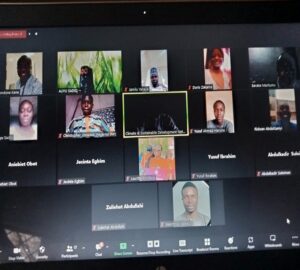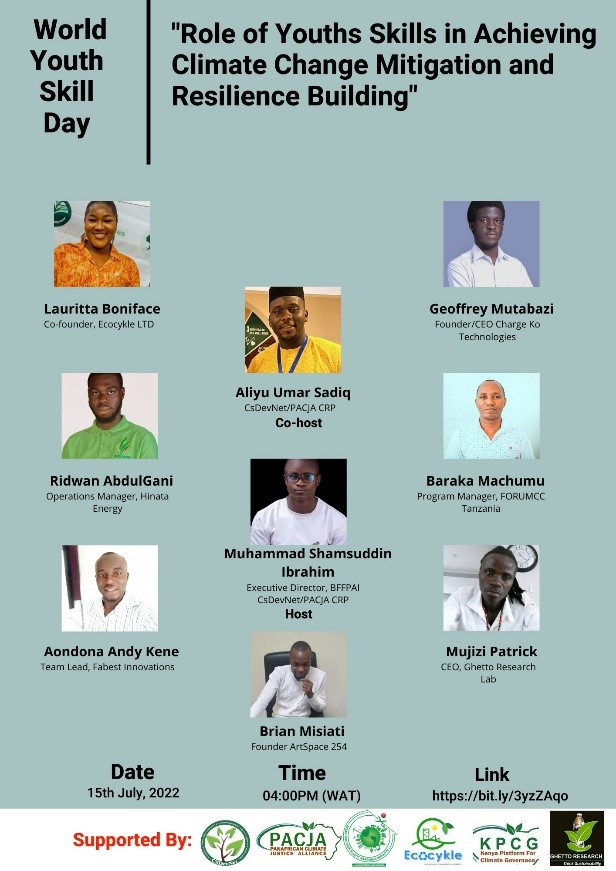
As climate change worsens and dangerous weather events become more frequent/severe daily, experts convene to discuss the valuable contributions of young people to climate action and the role of youth skills in achieving climate change mitigation and resilience building.
This was accomplished through a webinar hosted by the Climate and Sustainable Development Network (CSDevNet) on July 15th 2022 in commemoration of the World Youth Skills Day, in collaboration with the Pan African Climate Justice Alliance (PACJA), Break-Free From Plastic Initiative (BFFPAI), Ecocykle Limited, Kenyan Platform for Climate Governance (KPCG) and Ghetto Research.
As part of CSDevNet’s objective to ensure community empowerment and build resilience to the impacts of climate change, the event was strategic towards amplifying and advancing the acquisition of climate smart skills by youths targeted towards achieving climate change mitigation and resilience building in most vulnerable communities.
It gathered experts from across Africa working around various climate smart solutions to address the current climate change challenges affecting the world. Discussion centered around the role of youths in achieving climate change mitigation and resilience building.
The goal of the webinar was to spotlight change makers across Africa who are doing exceptionally well in creating innovative solutions and also inspire other youths to take action in their respective locations to help collectively combat climate change.
In a brief submission to welcome participants, Ibrahim Muhammad Shamsuddin, Executive Director of BFFPAI, who moderated the session, stated that delivering climate plans enables the transitioning of economies, which will create the need for different skills.
Ibrahim said: “Findings from the analysis of several countries’ experience revealed that skill shortages and gaps already constrain the transition to a greener and climate-resilient economy.”
Team Lead of Fabest Innovations, Aondo Kenny, in his presentation, underlined the need for youths to seek greener jobs.
“Looking at the high rate of unemployment in Nigeria, it becomes necessary for us to change the narrative by adopting and localizing smart innovations to solve waste management challenges and create jobs,” he said.
Another resource person AbdulGaniyi Ridwan, Operations Manager at Hinata Energy, emphasised that: “World youth skill day should focus sustainably on living in Harmony with nature and I believe that there is a need to analyze and address impacts of human disruption on earth natural system and its environment”.
Programme Manager, Tanzanian Civil Society Forum on Climate Change (FORUMCC), Baraka Muchumu, in his presentation, elaborated the need for young people to endeavour to be good examples to global youth especially those from their communities.

“For me, I see waste management as a problem in my community and I try to address this problem by helping people with access to clean cooking energy. Through this, we create jobs for youths,” he said.
Reiterating on climate solutions, Lauritta Boniface, Co-founder of Ecocykle Limited, said: “It is very important for we as young people to align our individual skills towards combating climate change because it is a global problem affecting everyone and we need a more sustainable solutions to address this problem”.
Founder/CEO of Charge Ko Technologies, Geofrey Mutabazi, centered his presentation on how youth can harness their potentials and hone their creativities.
“Youths must identify their unique skills, be intentional about building on that skill and leverage it to solve problems in their communities,” he said.
Brian Misiati, Founder of ArtSpace 254, mentioned that global discussions should focus on strengthening green skills for climate change mitigation, as well as addressing skills development for adaptation.
“It is unfortunate that policies are being made for the youths, we can talk for ourselves but we can only do that if we partner from the global south, south to south. Youths must think globally and act locally,” he concluded.

